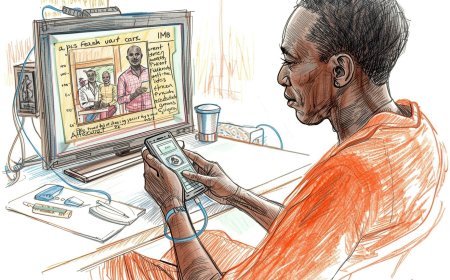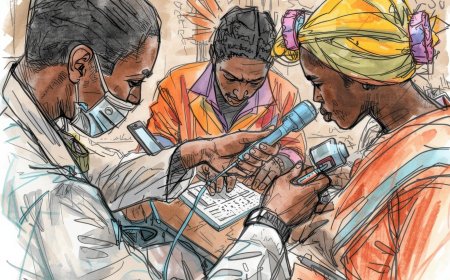Legal & Regulatory Checklist for Running Teleconsultations in Kenya
A practical, Kenya-focused legal and regulatory playbook for teleconsultation platforms and clinics. Covers provider & facility licensing, virtual-services registration, prescribing/e-prescribing rules, pharmacy/dispenser requirements, data protection & consent, cross-border practice, clinical governance, indemnity, and an actionable compliance checklist and 8-week rollout roadmap. Includes Kenyan laws, regulator guidance, and live APA citations so teams can act confidently.

Short brief: If you want to run teleconsultations in Kenya without sleepless nights, start with the law — not the marketing deck. This guide walks product teams, clinic managers, legal counsels and health-tech founders through the actual legal boxes to tick (and how to tick them) so your teleconsultation service is lawful, safe and scalable. Expect practical checklists, a cheeky clinic anecdote, and direct links to the key Kenyan rules and draft regulations you’ll actually be asked about.
Quick-opening anecdote (because real life is messy)
A Nairobi clinic launched a teleconsultation line during a rainy week. Patients loved it — until a visiting pharmacist refused to dispense an e-script because the teleclinic hadn’t registered with the Pharmacy and Poisons Board. The clinic learned two things fast: (1) e-prescriptions without verified legal workflows are paper lions; (2) regulators notice fast when medicines are involved. Moral: check the regulators before you scale the marketing. web.pharmacyboardkenya.org+1
How Kenya currently frames telemedicine (short legal snapshot)
-
The Health Act (2017) recognises e-health / telemedicine as part of health service delivery, creating the legal basis for remote consultations but leaving many operational details to regulators. kmpdc.go.ke
-
Kenya Medical Practitioners & Dentists Council (KMPDC) has published e-Health guidance, runs a registry/approval process for virtual medical service providers, and issues licences for facilities offering telemedicine. Expect registration requirements and facility-level compliance checks. kmpdc.go.ke+1
-
Pharmacy & Poisons Board (PPB) issued Guidelines for Internet Pharmacy Services (2022) which set rules for e-prescriptions, pharmacist verification and online dispensing — essential when your teleconsults create prescriptions. web.pharmacyboardkenya.org
-
Data Protection Act (2019) is the backbone for patient data security and privacy: it spells controller/processor duties, consent, data subject rights and breach obligations. Telehealth platforms are squarely within its scope. Kenya Law
-
The National eHealth Policy (2016–2030) and recent draft Digital Health / Data Exchange Regulations (2024) show Kenya is formalising digital-health rules — some parts are draft but signal where enforcement will tighten. WHO Extranet+1
(See references for links to all the documents.) Health Kenya+4kmpdc.go.ke+4kmpdc.go.ke+4
The 12-point legal & regulatory checklist (actionable)
Below is the single most important list you’ll use. For each item I include what to do, why it matters, and where to get proof.
-
Clinician licensure & scope of practice
-
Do this: Ensure every clinician who consults remotely is licensed by KMPDC and is practising within their scope. Keep copies of licenses and CPD records on file for audits.
-
Why: Practising medicine without registration is an offence; KMPDC enforces standards for telemedicine. kmpdc.go.ke+1
-
-
Register as a Virtual Medical Services Provider / Facility
-
Do this: Apply to KMPDC using the Virtual Medical Services Provider application form; designate a Kenyan-registered Medical Director responsible for the service. Maintain facility registration and annual renewals.
-
Why: KMPDC approvals are being issued for telemedicine facilities and the Council expects alignment with medical records and data protection standards. Keep the registration certificate on your platform. kmpdc.go.ke+1
-
-
E-prescribing governance (clinician & platform rules)
-
Do this: Build an auditable e-prescription workflow: authenticated prescriber sign-off, time-stamped records, anti-tamper signatures and pharmacist verification links. Implement limits for controlled medicines (often restricted).
-
Why: E-prescriptions are allowed but must meet traceability and verification expectations — pharmacies will ask for clear provenance before dispensing. web.pharmacyboardkenya.org+1
-
-
Pharmacy & dispenser compliance (partner pharmacies / e-pharmacies)
-
Do this: If you integrate dispensing, only partner with PPB-registered pharmacies and ensure they comply with the Guidelines for Internet Pharmacy Services (registration, pharmacist review, record keeping). Contractually require regulatory compliance & audits.
-
Why: Online dispensing is regulated; noncompliant e-pharmacies risk enforcement and your patients' safety. web.pharmacyboardkenya.org
-
-
Data protection & privacy (Data Protection Act 2019)
-
Do this: Appoint a Data Protection Officer (if required), register processing activities (Record of Processing), obtain explicit informed consent for health data, implement TLS/encryption, role-based access, data minimisation and breach-response SOPs. Keep DPIAs for high-risk data uses (AI, third-party sharing).
-
Why: Personal health data is “special” and the Act imposes duties and penalties; noncompliance risks fines and operational shutdown. Kenya Law
-
-
Clinical governance & standard operating procedures
-
Do this: Publish SOPs: triage rules (when teleconsult vs refer), emergency escalation pathways, appointment and no-show policies, informed consent scripts, documentation/records rules, and audit logs. Train staff and keep logs of training. kmpdc.go.ke+1
-
-
Informed consent (explicit & documented)
-
Do this: Obtain and record explicit consent (audio/PDF/checkbox) for teleconsultation, data storage/processing, and e-prescriptions. Provide a short patient privacy notice in local languages. Retain consent evidence.
-
Why: The Data Protection Act requires lawful basis and clear consent for processing sensitive data. Consent also reduces medico-legal exposure. Kenya Law
-
-
Cross-border practice & foreign clinicians
-
Do this: If clinicians are based outside Kenya, ensure they are registered or granted permission by KMPDC (the Council requires registration to practise in Kenya) or use provider-to-provider models where Kenya-based clinician co-signs. Check draft regulations for telemedicine registries. kmpdc.go.ke+1
-
-
Controlled substances & prescribing limits
-
Do this: Implement hard blocks and manual pharmacist verification for Schedule-controlled drugs; document justification and referral for in-person assessments when needed. Consult Pharmacy and Poisons rules and MoH guidance.
-
Why: Many jurisdictions restrict remote prescribing of controlled substances; pharmacies will refuse to dispense without compliant workflows. web.pharmacyboardkenya.org
-
-
Security & data residency considerations
-
Do this: Encrypt data at rest and in transit, maintain access logs, use Kenyan-hosted servers or ensure processors meet Act requirements, and have clear data retention policies. Register processors if applicable.
-
Why: The Data Protection Act governs cross-border transfers and imposes controller responsibilities — treat cloud hosting choices carefully. Kenya Law+1
-
-
Advertising, consumer protection & pricing transparency
-
Do this: Follow Consumer Protection rules and avoid unverified claims. Display clear pricing, clinician qualifications, refund/no-show policies, and contact for complaints. Keep evidence for any advertised clinical claims. kmpdc.go.ke+1
-
-
Insurance, indemnity & malpractice cover
-
Do this: Ensure professional indemnity covers telemedicine and cross-jurisdictional practice, and verify insurer acceptance of teleconsult models. If not, secure additional coverage.
-
Why: Teleconsults carry specific liability (missed signs, connectivity fail); insurers must explicitly cover remote care.
-
Practical steps: paperwork, tech & contracts (what to prepare now)
-
Legal & regulator folder (scanned & accessible): clinician licences, facility registration, KMPDC virtual provider approval, PPB pharmacy partner licences, DPO contact, Data Protection registration receipts (if any). kmpdc.go.ke+1
-
Policy documents: SOPs for triage, emergency transfer, informed consent script, e-prescribing flow, data breach response, data retention schedule. kmpdc.go.ke
-
Tech checklist: signed prescriber authentication (2FA), audit logs, e-prescription tamper protection, encrypted backups, role-based access, and a tested backup (call-in) workflow for low-bandwidth patients. Kenya Law+1
-
Contracts: written agreements with pharmacies, couriers, cloud vendors, and clinicians that include compliance clauses, audit rights and liability allocation. web.pharmacyboardkenya.org
-
Patient materials: short privacy notice + consent form in English/Swahili/local languages, a “how teleconsult works” one-pager, and escalation contact. Kenya Law
Sample informed-consent script (copy, localise, file)
“Hello, my name is [Clinician]. This is a teleconsultation. We will discuss your health and record personal and medical information. Your information will be stored securely and used only for your care. If you agree, reply YES and we will begin. You may withdraw at any time and ask that records be deleted or transferred. For questions call [clinic number].”
Store the patient’s recorded YES (audio or checkbox) and the timestamp. This satisfies both informed-consent and audit-trail needs. Kenya Law
Special notes & red flags (regulatory watchlist)
-
Draft regulations are moving fast. The Ministry of Health’s 2024 draft RIS and proposed Digital Health Regulations create new registry and data-exchange obligations. Monitor MOH gazettes — compliance expectations will increase. Plan for registry entries and audit readiness. Health Kenya+1
-
Pharmacy enforcement is active. PPB inspects internet pharmacy services; noncompliant e-pharmacies risk sanctions. If your teleconsults issue e-scripts, partner only with-compliant pharmacies, and require proof. web.pharmacyboardkenya.org
-
Cross-border clinicians are tricky. KMPDC has processes for approving virtual providers; don’t assume foreign licensure covers Kenyan patients. The safe model is local registration or Kenya-based supervising clinician. kmpdc.go.ke
Eight-week compliance roadmap (practical timeline)
Week 0 — Legal & regulator scan: collect policies, contact KMPDC + PPB for procedural checklists. kmpdc.go.ke+1
Week 1 — Appoint Medical Director, DPO, and responsible officers; begin Virtual Provider application. kmpdc.go.ke
Week 2 — Draft SOPs (triage, consent, e-prescribing, referral), and draft contracts with pharmacies and cloud providers. kmpdc.go.ke+1
Week 3 — Implement tech controls (2FA, TLS, audit logs, encrypted backups), and complete Data Protection impact assessment if needed. Kenya Law
Week 4 — Staff training & mock teleconsults; consent capture testing and record retention checks.
Week 5 — Apply for KMPDC virtual services registration; submit sample SOPs and clinician lists. kmpdc.go.ke
Week 6 — Sign agreements with PPB-registered pharmacy partners; test e-prescription to dispensing flow. web.pharmacyboardkenya.org
Week 7 — Run a soft pilot (100 visits): audit compliance, consent capture, and data flows.
Week 8 — Review pilot, fix gaps, submit any additional regulator queries, and scale.
Enforcement & penalties — what to expect
Regulators (KMPDC, PPB, MoH and the Office of the Data Protection Commissioner) have powers to inspect, issue notices, and take enforcement action (fines, licence suspension). Recent activity shows the PPB and KMPDC actively engage with telemedicine/e-pharmacy services — treat compliance as ongoing, not a one-off. kmpdc.go.ke+1
Quick clinic-ready compliance checklist (pin this to the wall)
-
All clinicians registered with KMPDC and within scope? kmpdc.go.ke
-
Virtual Medical Services Provider application submitted & on file? kmpdc.go.ke
-
Partner pharmacies PPB-registered and compliant with Internet Pharmacy Guidelines? web.pharmacyboardkenya.org
-
Explicit patient consent capture working (audio/checkbox) & stored? Kenya Law
-
Data Protection Officer appointed and DPIA completed (if required)? Kenya Law
-
SOPs for triage, emergency escalation, and e-prescribing ready & staff trained? kmpdc.go.ke
-
Indemnity insurance covers telemedicine? Y/N.
-
Contracts with cloud vendors & pharmacies include compliance clauses & audit rights? Y/N. web.pharmacyboardkenya.org
Resources — quick links you will need (APA + live URLs)
-
Kenya Medical Practitioners and Dentists Council. (n.d.). Application for registration as a virtual medical services provider (form). https://kmpdc.go.ke/resources/Application%20for%20Registration%20as%20a%20Virtual%20Medical%20Services%20Provider.pdf. kmpdc.go.ke
-
Kenya Medical Practitioners and Dentists Council. (2021). Telemedicine gains pace in Kenya as KMPDC approves 20 hospitals to roll out services. https://kmpdc.go.ke/2021/02/28/telemedicine-gains-pace-in-kenya-as-kmpdc-approves-20-hospitals-to-roll-out-services-amid-covid-19-containment-measures/. kmpdc.go.ke
-
Pharmacy and Poisons Board (Kenya). (2022). Guidelines for Internet Pharmacy Services in Kenya. https://web.pharmacyboardkenya.org/download/guidelines-on-internet-pharmacy-services/. web.pharmacyboardkenya.org
-
Republic of Kenya. (2019). Data Protection Act, No. 24 of 2019. https://new.kenyalaw.org/akn/ke/act/2019/24. Kenya Law
-
Republic of Kenya. (2017). Health Act, No. 21 of 2017. https://kmpdc.go.ke/resources/Health_Act_No.%2021of2017.pdf. kmpdc.go.ke
-
Ministry of Health (Kenya). (2016). Kenya National eHealth Policy 2016–2030. https://extranet.who.int/countryplanningcycles/sites/default/files/public_file_rep/KEN_Kenya_National-eHealth-Policy_2016-2030.pdf. WHO Extranet
-
Ministry of Health (Kenya). (2024). Draft RIS for Digital Health Regulations / Digital Health (Data Exchange) Regulations (2024) — Regulatory Impact Statement (draft). https://health.go.ke/sites/default/files/2024-11/DRAFT%20RIS%20FOR%20DIGITAL%20HEALTH%20REGULATIONS%20-%2018.11.2024%20%282%29.pdf. Health Kenya
-
Ministry of Health (Kenya). (2021). National Tele-Mental Health Guidelines. https://arua-ncd.org/wp-content/uploads/2022/10/M.O.H-National-Tele-Mental-Health-Guidelines-January-2021.pdf. Arua ncd
What's Your Reaction?
 Like
0
Like
0
 Dislike
0
Dislike
0
 Love
0
Love
0
 Funny
0
Funny
0
 Angry
0
Angry
0
 Sad
0
Sad
0
 Wow
0
Wow
0













































